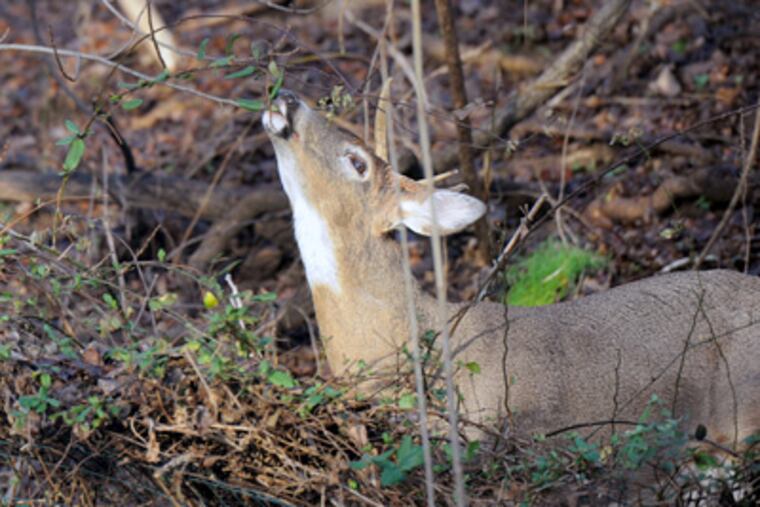Seeking common ground on N.J. forests
Both sides agree: New Jersey's sprawling public and private forests face serious challenges and must be better managed. The woodlands are under attack from insects, disease, invasive plant species, fires, and herds of deer feeding on new growth.

Both sides agree: New Jersey's sprawling public and private forests face serious challenges and must be better managed.
The woodlands are under attack from insects, disease, invasive plant species, fires, and herds of deer feeding on new growth.
But conservationists, ecologists, certified foresters, scientists, and politicians don't agree on how to address the problems.
They are on both sides of a controversial state legislative measure - likely to be voted on in Trenton next month - that would inventory the woodlands and permit commercial tree-cutting on public land as well as the sale of wood as a way of paying for the program.
The Department of Environmental Protection (DEP) would choose a contractor to oversee the effort for five years, plan the logging, and get the best price for timber. The bill, sponsored by Sen. Bob Smith (D., Middlesex-Somerset) affects New Jersey's Highlands, not the Pinelands.
But opponents say it will do more harm than good because it does nothing to stop the large numbers of deer that feed on new growth. And they say it doesn't take into account invasive species that take over when the forest canopy is opened up, letting in more sunlight.
"No one suggests this bill would turn the logging industry loose on the forests," said supporter Bob Williams, a certified forester with Land Dimensions Engineering in Glassboro who manages private forests in New Jersey and Maryland. "I'm not aware of anyone suggesting clear-cuts or massive intervention.
"But loggers can play an important role in sustaining the forest when they're pointed in the right direction," he said. "The amount of land where logging would take place is fairly modest."
Cutting some trees helps leave the forests healthier, the legislation's supporters say. It means more sunlight and more nutrients to feed new growth.
"By removing some trees, you can enhance more desirable species," such as oaks, Williams said. "You thin to get resilience in the forest so trees can fend off insects and disease."
The measure calls for a much-needed inventory and provides resources - from the proceeds of logging - "to manage the forests in a healthy and sustainable way," said Barbara McConnell, a spokeswoman for the New Jersey Forestry Association, a nonprofit forest management advocacy organization representing private woodland owners. "An essential part of a good forestry plan involves some cutting and thinning."
Opponents say their concerns are real. The damage from deer and takeover by Asian vines, grasses, and shrubs has a serious impact on the state's forests, said Emile DeVito, manager of science and stewardship for the New Jersey Conservation Foundation, a nonprofit group and land trust.
The bill, he said, doesn't call for fencing around logged areas and doesn't provide for herbicides to prevent the invasion of weeds.
"If you took the forest to the doctor and asked how you cure it, he'd say cutting down trees makes it worse," DeVito said. "I would like the state and DEP to attack the real problems - the deer herd and invasive species."
DeVito said the state can "work in concert" with natural processes - including fires and pine bark beetles - to thin the forest.
"Just cutting trees and removing them is not necessarily good," added Carleton Montgomery, executive director of the Pinelands Preservation Alliance, a nonprofit advocacy and public education group devoted to the Pine Barrens. "Logging does not replicate natural processes.
"When you remove trees as a commercial product, you remove the biomass from the ecological system," he said. "In a fire, the tree is killed but litter remains. It stays as part of the nutrient cycle that sustains the forest."
Dead trees also provide habitats for birds and other creatures "but all of that is taken out in a commercial forest operation," he said.
The two sides can find common ground, Williams said. He agrees with bill opponents that the deer are a major problem. And like them, he's opposed to widespread logging.
"To cut everywhere is silly," he said. "There are stands of trees where if the state proposed cutting, I would stand there and say, 'No, you won't cut these trees.' "